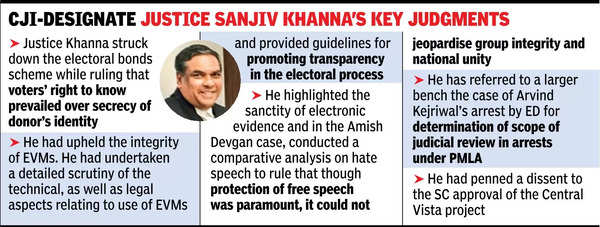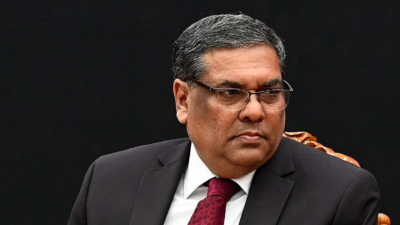NEW DELHI: Personal setbacks and achievements matter little to CJI-designate Sanjiv Khanna, whose family, nearly half a century ago, took in its stride the unceremonious supersession of his uncle Justice H R Khanna, who stood up for citizens’ rights undaunted by the might of Union govt during the dark days of Emergency.
He himself was fourth time lucky in getting appointed as a judge of Delhi high court, with govt ignoring three prior recommendations by the collegium for his judgeship.
Justice H R Khanna, held in high esteem, had indirectly conveyed that he would not speak to anyone for Sanjiv Khanna’s appointment. Integrity, dignity and bluntness run deep in the Khanna family. When the President signed his warrant of appointment as a judge of Delhi HC in June 2005 and the then high court Chief Justice B C Patel phoned and asked him to take oath the next day, Khanna was driving his WagonR and was a few kilometres short of his ancestral home in Dalhousie.
Any other person would have rushed back to take oath, but not Khanna who zealously guards his privacy and enjoys family time. Parking the car on roadside, he took the call and told Justice Patel that he wouldn’t alter his plan to spend few days in Dalhousie with his family, wife and two kids. True to his words, he returned to Delhi after 4-5 days and took oath on June 24, 2005.
After nearly two decades as a constitutional court judge, six of them as judge of SC, Justice Khanna is set to take oath as the 51st CJI on Nov 11. With a tenure of six months and three days, he is aware of the time constraint for any major policy reform. But he is keen to deal with pendency, which has crossed the 82,000-mark in the apex court.
His primary focus during the short tenure will be to lay down a mechanism to reduce pendency and speed up justice delivery in the top court, TOI gathered during a couple of interactions with him recently. On Tuesday, an SC source told TOI, “In fact, CJI-designate has already commenced the process, in consultation with colleagues, to improve the existing mechanism to decide cases pending for years.”

The first year of judgeship in Delhi HC was a lesson for him. Overenthusiastic about reducing pendency, he had reserved judgment in over 100 cases, a task that made him realise that rendering decisions must be as swift as concluding hearing. He took six months to write pending judgments and thereafter, there has never been an occasion when he had more than five judgments pending at a given time.
As a media and publicity shy person, Justice Khanna realises that he needs to change his outlook towards interacting with journalists but is firm that it would not be at the cost of his privacy and institutional dignity.
He agrees with CJI D Y Chandrachud and says he has never come across a situation where influence from any quarter is exerted on him to render a desired decision.
Chief Justice D Y Chandrachud, who is scheduled to retire on Nov 10, had recommended Justice Khanna as his successor in office, on Oct 17. Born on May 14, 1960, Justice Khanna enrolled as an advocate with the Bar Council of Delhi in 1983. He said, “There can never be an occasion when anyone could dare approach me in a judicial matter.”
During interactions with TOI, Justice Khanna acknowledged that an increasing number of people were rushing to SC with writ petitions and PILs, which took up considerable judicial time. HCs have wide power under Art 226 to deal with state-specific issues and Supreme Court should deal with pan-India matters, especially when it requires urgent intervention to prevent substantial ill-effects, he added.
